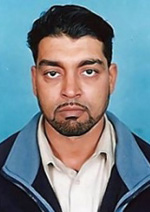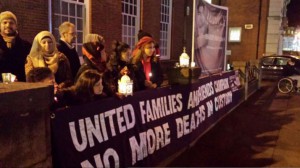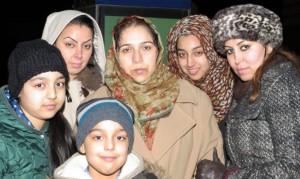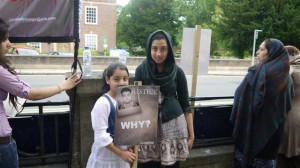On 2 March, a second inquest recorded a critical misadventure and narrative verdict into the death of Habib ‘Paps’ Ullah on 3 July 2008, after being stopped and forcefully searched by police in High Wycombe.
 The verdict marks seven years of campaigning by his family, who have consistently marked the anniversary of his death, every July, at High Wycombe police station, and marked his birthday every December, too.
The verdict marks seven years of campaigning by his family, who have consistently marked the anniversary of his death, every July, at High Wycombe police station, and marked his birthday every December, too.
An earlier inquest, in December 2010, was abandoned after it emerged that police officers had changed their statements following the death after receiving legal advice. Crucial facts were omitted from their statements including that the three occupants of the car had willingly cooperated with police and their stop and search. Key words were also omitted or changed; for example one officer had described how another officer had struck Ullah ‘with some force’, but this was omitted, as was a reference to an officer applying pressure to Ullah’s ear as part of the restraint. The name of a witness was also removed from one officer’s statement.
The second inquest commenced in rural Beaconsfield on 2 February 2015. The five officers involved, DS Jason Liles, PC Christopher Pomery, DC Richard Bazeley, PC Howard Wynne and PC Katie Granger, had wanted to give their evidence from behind screens but the coroner, Richard Hulett, refused permission. During the inquest some officers had to be warned on a number of occasions not to mention Ullah’s background and previous interactions with police.

Initial evidence revealed that the duration of the stop and search was twenty minutes, at which point an ambulance was called, and that Ullah had been compliant and had cooperated with the officers while he and the car were searched. DC Bazeley told the inquest that he ‘strongly suspected he had drugs in his mouth and was attempting to swallow them’. He admitted to having received no training on conducting mouth searches at the time (and later in the incident thought that Ullah was feigning injury).
It was only when Ullah turned his back on the officers that DS Jason Liles hit him hard on the back with maximum force and shouted ‘spit it out’. This was followed by Liles shouting ‘break his arm’ when Bazeley lost his grip. Liles repeated the back slaps twice more while Ullah was on his knees – quite contrary to police training.
PC Pomery was found to have used three unauthorised techniques in restraining Ullah – grabbing his throat, grabbing his nostrils and putting his thumb on his chin. He told the inquest that he thought that Ullah had been ‘play acting’. Pomeroy also allegedly told another police officer later on that night at the station that: ‘He had hoped that he had not grabbed the deceased too hard in order to get the drugs out’. She had also seen him looking ‘pale … and very subdued’. It should be noted that a post mortem found twenty-five injuries on Ullah including bruising on his jaw, neck, Adam’s apple, arms, elbows and internal bruising on the middle and lower back and the back of his neck.
Emma Dellaway who was in the car with Habib told the inquest that the police officers were ‘ripping the car apart’ in a ‘desperate’ and ‘ridiculous’ attempt to find something. During the restraint she had shouted at the officers ‘you are going to strangle him’ and that the officers had been ‘hanging off him’. Ullah’s face had then turned blue, and then grey, and still the officers did nothing. In her words, ‘he was laying there dying and they did nothing’. Morris Nedd the other occupant of the car told the inquest: ‘There will be people thinking I just stood by and let police kill him.’ He saw the police officers grab both his arms as ‘they went for his throat’ and that officers ‘didn’t give him a chance’ to spit the package out of his mouth. Saying that: ‘They were trying to get him on the floor but they couldn’t do it so they used even more force. They were getting frustrated.’

A neighbour of Emma Dellaway’s confirmed the amount of force being used, telling the inquest that she had heard officers saying ‘get hold of him’, ‘don’t let him go’, ‘get it out of his mouth’, and adding ‘I felt totally sick and disgusted at what was going on on my doorstep.’
The long narrative verdict from the jury (which can be read here) was highly critical of the physical force and risky compliance techniques used on Ullah, as well as the fact that several officers acted simultaneously to subdue him whilst he was prone. Finally the jury found that no resuscitation was attempted, nor was Ullah placed in the recovery position before the ambulance arrived, despite several officers recognising his abnormal breathing. ‘Valuable time was lost’, states the verdict, ‘due to the fact that the officers believed him to be feigning unconsciousness.’
The family now waits for Thames Valley Police to hold misconduct hearings as the five officers are all facing gross misconduct charges, the IPCC having earlier decided that the officers were not to be charged with manslaughter by gross negligence, misconduct in public office, perjury and perverting the course of justice. The community of support around the case will keep up the pressure for accountability. ‘NJNP’ (no justice no peace) read the graffiti daubed across cars in High Wycombe on the nights following the verdict.
Comments after the verdict
Nasrit Mahmood, sister of Habib Ullah said, after the verdict:

‘We are pleased that we have a critical narrative verdict. It’s been an extremely difficult time for the family since my brother, Habib, died at the hands of Thames Valley Police. What is so hard to accept is that it has taken almost seven years for an inquest to be completed into his death. All these years of fighting has taken a tremendous toll on the family and just in the last few days, my late brother’s wife has had to go to hospital again due to panic attacks. There are still many matters that remain unresolved. We are deeply unhappy about events that took place afterwards at the police station and the way statements were changed. We hope that the forthcoming disciplinary hearings will be both effective and will send out a clear message to officers about their conduct. We would like to thank our legal team Anthony Metzer QC and Marian Ellingworth for their support and hard work on our Habib’s case and our two brother Saqib Deshmukh and Zia Ullah without whom there would be no campaign.’
Zia Ullah, Justice4Paps said:
‘It is only right that people irrespective of their positions are accountable for their actions. It has been a long and drawn out journey in trying to hold Thames Valley Police and their officers to account. What we didn’t expect was that officers would change their statements, withhold evidence. At every point, even with the involvement of the IPCC attempts were made to bend what had happened to the extent that the first inquest had to be abandoned! Our family campaign has been resilient and persistent in challenging the false narratives and smearing of Habib. It is this persistence that has seen justice upheld today with this verdict and this completely vindicates our campaign and our initial concerns. Although we have reached an outcome, seven years of campaigning has left no faith in the very institutions that are supposed to investigate the police and ensure that justice is served.’
Related links
You can read in the inquest verdict in full here
Justice for Habib Paps Ullah Campaign
IRR News story: Sudden about turn in Habib Ullah case
IRR News story: Snail’s pace in deaths in custody investigations
INQUEST press release


I can’t believe I didn’t know about this case. It is shocking how these officers had a total disregard for their responsibilities and their positions. Having the power to uphold the law does not make you above the law and there are too many cases of police outnumbering one suspect three to one, four to one or even to six to one and using excessive force. This family has suffered and the institutions that are meant to protect them have ultimately failed them, especially disappointing in all of this is the IPCC’s lack of impartiality enabling the officers concerned to have a feeling of total immunity to answer for their actions. Cases like this will reinforce the feeling by many in the BAME communities that their is one law for people who share the same skin colour as the officers in question and another for all others.